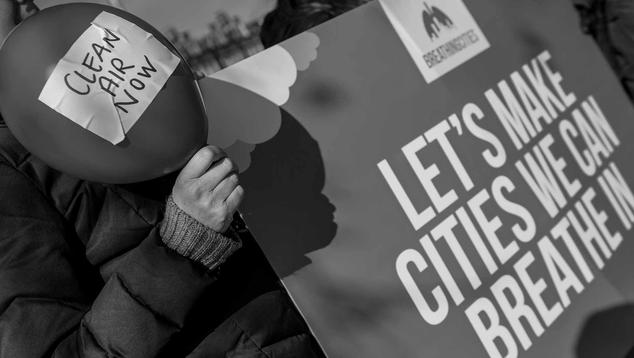Europeans flocked to the polling stations in late May in numbers not seen since 1999 to elect a new swath of representatives into the European Parliament. Migration, security and the overall future of the European Union were on voters' minds as they cast their ballots, but in addition to the changing political climate, many were also thinking about climate change.
Europeans have become increasingly supportive of public action to reduce humanity's toll on the environment and counter climate change, but the size of the "Green Wave" that swept the ballot boxes in many European nations was much larger than anyone expected. Collecting 75 of the 751 seats in the European Parliament, the once left-out Green Party is now the fourth-largest party.
However, if you look at this year's election results and compare them with people's satisfaction with their country's efforts to preserve the environment, we see that dissatisfaction was rising in many of the countries that had break-away Green Party success.
| Dissatisfaction level 2014 | EU Election Green vote 2014 | Dissatisfaction level 2018 | EU Election Green Vote 2019 | ||||||||||||||||||||||||||||||||||||||||||||||||||||||||||||||||||||||||||||||||||||||||||||||||
|---|---|---|---|---|---|---|---|---|---|---|---|---|---|---|---|---|---|---|---|---|---|---|---|---|---|---|---|---|---|---|---|---|---|---|---|---|---|---|---|---|---|---|---|---|---|---|---|---|---|---|---|---|---|---|---|---|---|---|---|---|---|---|---|---|---|---|---|---|---|---|---|---|---|---|---|---|---|---|---|---|---|---|---|---|---|---|---|---|---|---|---|---|---|---|---|---|---|---|---|
| % | % | % | % | ||||||||||||||||||||||||||||||||||||||||||||||||||||||||||||||||||||||||||||||||||||||||||||||||
| Belgium | 29 | 11 | 50 | 15 | |||||||||||||||||||||||||||||||||||||||||||||||||||||||||||||||||||||||||||||||||||||||||||||||
| France | 40 | 9 | 45 | 13 | |||||||||||||||||||||||||||||||||||||||||||||||||||||||||||||||||||||||||||||||||||||||||||||||
| Germany | 27 | 13 | 38 | 25 | |||||||||||||||||||||||||||||||||||||||||||||||||||||||||||||||||||||||||||||||||||||||||||||||
| United Kingdom | 32 | 11 | 36 | 16 | |||||||||||||||||||||||||||||||||||||||||||||||||||||||||||||||||||||||||||||||||||||||||||||||
| Gallup World Poll | |||||||||||||||||||||||||||||||||||||||||||||||||||||||||||||||||||||||||||||||||||||||||||||||||||
One must wonder what factors were at play that pushed the general public to begin voting en masse for a party that was a relatively minor player just one election cycle before.
Through its World Poll instrument, Gallup has been tracking public sentiment in Europe -- and around the world -- for the past 14 years on myriad issues, ranging from how people rate their lives to their trust in their national institutions. When we asked people across Europe about their satisfaction toward their country's efforts in preserving the environment, there was a sense of rising dissatisfaction in several key countries.
Germany
The Greens experienced a resounding victory in Germany, becoming the country's leading left-wing party, receiving slightly over 25% of the national vote. This came as German satisfaction with efforts to preserve the environment had dropped a record low (58%) and dissatisfaction had increased 11 percentage points to 38%.
The 2019 European election saw the Greens double their 2014 election result and secure an unprecedented 25 of Germany's 96 seats, just four shy of Chancellor Angela Merkel's party with 29.
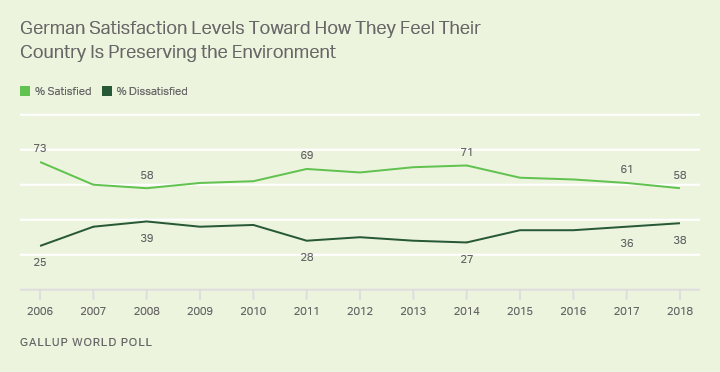
Belgium
In Belgium, voters came out to elect European, federal and regional representatives. While the right-wing, conservative New Flemish Alliance remained the largest party in Belgium, winning around 13.73% percent of the vote, the Greens finished strongly, collecting a combined 15% of the vote from strong finishes in Brussels and the South.
Since the 2014 European elections, when the Greens held slightly over 10% of the vote, Belgians' dissatisfaction with their country's efforts to preserve the environment has increased by 21 percentage points, bringing the percentage of dissatisfied residents to 50%. The Greens now have increased their number of MEPs from two to three out of Belgium's 21 seats.
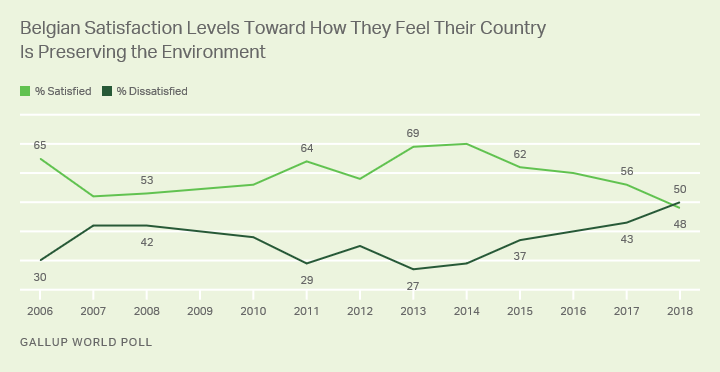
France
The French election was set to be a duel between President Emmanuel Macron's pro-EU platform that included his party La République En Marche!, and Marine Le Pen's far-right and newly christened, National Rally. Le Pen came out the victor, winning 23.31% of the vote in contrast to Macron's 22.41%, but the Greens were the showstopper, securing 13.47% of the vote.
This five-percentage-point rise for the French Green Party since 2014 has been accompanied with a five-percentage-point increase in French dissatisfaction toward their country's efforts regarding environmental preservation, while their satisfaction is on the low end for measures in the past decade. The Greens now have increased their number of MEPs from six to 12 out of France's 74 seats.
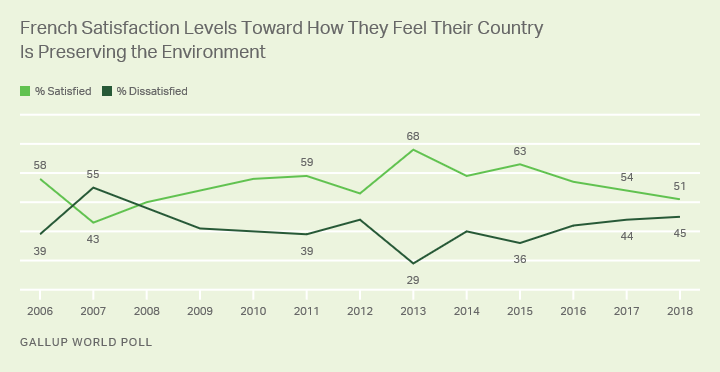
United Kingdom
In the United Kingdom, the decimation of MEP seats once held by the Labor and Conservative parties led to a more even distribution of MEPs throughout the parties, with Nigel Farage's newly minted Brexit Party seizing 30.74% of the vote and 29 of the UK's 73 seats. With national turnout topping 36.9%, the highest it has ever been in the United Kingdom, the Green affiliated parties were able to secure 16.23% of the vote and claim 11 MEP seats, five more than in 2015.
Since 2013, Britons' satisfaction with efforts to preserve the environment has been in decline, just as their dissatisfaction has risen.
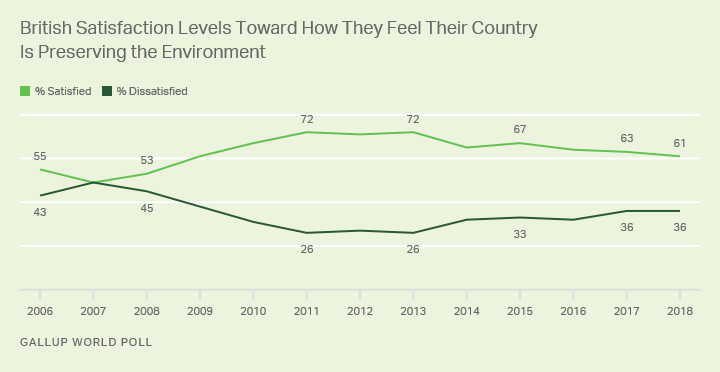
Implications
When one looks at the change in dissatisfaction with efforts to preserve the environment between the 2014 and 2019 European elections, we see that there has been a growing negative sentiment within the countries that had strong voter turnout for the Green Party. With these factors in mind, perhaps the European Greens manifesto that climate change and the environment "is the very substance of our political struggle and we will keep on being uncompromising on the necessity of concrete climate policies" resonated with European voters.
While Europe closes out the election season, the U.S. is emerging full swing into the 2020 presidential election. In the next article of this series, we explore the tumbling satisfaction rates of the American public regarding environmental preservation and its importance to the election.
Learn more about how the Gallup World Poll works.
